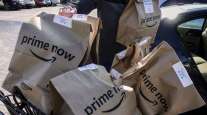Amazon Merchants Say Deliveries of Some Products Are Delayed

[Ensure you have all the info you need in these unprecedented times. Subscribe now.]
Amazon.com Inc. merchants around the U.S. say some products that normally reach customers in one or two days are now taking a week or longer just as the world’s largest online retailer heads into what’s expected to be a record-busting holiday shopping season.
Seven merchants and consultants from California, Texas, Wisconsin and Florida said they had to ship products ordinarily handled by Amazon’s logistics service, which typically is faster and cheaper. To the sellers, that suggests the company’s warehouses and delivery stations are at full capacity.
The development, which began over the weekend and continued this week, worries the merchants because web shopping will peak in the five-day period from Thanksgiving to Cyber Monday, the biggest online spending day of the year. Their experience was echoed by more than a dozen additional sellers in merchant chat rooms viewed by Bloomberg.
Amazon continues to deliver most products in one or two days through its logistics service, the merchants said. But because the company has issued no warning or explanation, they said it’s hard to figure out if any specific product categories are being affected or whether the shift is happening more in some regions than others.

According to Shelley Dellinger of Cargo Transporters and Alphonso Lewis, ATA’s Road Team Captain and YRC Freight driver, diversity in recruitment methods is essential. Hear a snippet, above, and get the full program by going to RoadSigns.TTNews.com.
One seller said Amazon seems to be prioritizing best-selling products for its own delivery system and letting merchants handle less popular items, echoing what happened earlier this year when Amazon was overwhelmed by panicked shoppers stuck at home when COVID-19 first swept the country.
In an email statement, an Amazon spokesman said a few anecdotes from merchants don’t necessarily add up to a broader problem. “We have not changed how offers are presented to customers to shift volume from Amazon fulfillment to seller fulfillment,” he said. “As always, product offers continue to compete to be the featured offer based on a variety of factors, including lowest price, availability, fastest delivery speed and best seller performance.”
U.S. shoppers will spend $189 billion in November and December, up 33% from a year earlier and more than double the usual pace of growth, according to Adobe Inc. Amazon captures about 40 cents of every dollar spent online in the U.S., meaning the company is under enormous pressure to keep customers happy. Amazon shipping times averaged a little more than two days during the week of Nov. 2, when consumers took a break from shopping for the election, according to the most recent data from Rakuten Intelligence.
RELATED: FedEx, UPS Feel Van Squeeze Amid E-Commerce Rush
Amazon has rushed to increase capacity since the pandemic hit, hiring 250,000 workers and spending billions on new warehouses and delivery stations. To ensure it has enough people to pick, pack and ship orders, the company has been offering signing bonuses of as much as $3,000 to new hires.
Even so, the merchants said, it appears Amazon is struggling to keep up.
Molson Hart, who sells stuffed animals and games on Amazon, said about 70% of his inventory is being delayed as much as one week. Amazon is prioritizing the most in-demand products for fast delivery while slower-selling products are subject to delays, he said.
“We can expect even longer delays and delivery disruptions come next week, when shipping volumes rise as much as five times,” Hart said. “The past couple of years, consumers grew accustomed to ordering products as late as Dec. 20 and having them delivered before Christmas. That is not likely to happen this year.”
RELATED: High Freight Demand Provides Momentum for Trucking Industry
One Amazon merchant said Amazon typically packs and ships almost all of his orders. But over the weekend, he was required to ship two types of product himself, including a power tool, even though Amazon had the merchandise in its warehouses. Another seller in Wisconsin, who sells flasks and tumblers, said he had to ship orders to customers in Michigan, Pennsylvania, New Jersey and Georgia over the past few days. The two sellers spoke on condition of anonymity out of fear of retribution from Amazon.
“There’s no rhyme or reason to the geography of the customer,” the Wisconsin merchant said. “If Amazon has any weaknesses, this weekend will show them more than any other.”
Online shoppers have come roaring back after an Election Day lull. Spending from Nov. 21 to Nov. 23 surged 49%, according to Adobe, putting a strain on delivery capacity. In recent weeks, Amazon’s marketing team has been exhorting customers to shop early in an effort to prevent a deluge of orders from overwhelming the company’s delivery operations.
Shoppers will tolerate delivery delays over the Thanksgiving weekend, which will give Amazon flexibility, but the pressure will intensify in the week before Christmas when other delivery carriers such as FedEx Corp. and UPS Inc. no longer guarantee delivery by Dec. 25, said James Thomson, a former Amazonian who helps merchants sell products on the site through his consulting firm Buy Box Experts.
“We expect sales to be insane Dec. 15-24,” Thomson said, adding that customers will flock to Amazon because they’ve come to see it as the online retailer that can reliably ensure delivery in time for Christmas.
— With assistance from Matt Day.
Want more news? Listen to today's daily briefing:
Subscribe: Apple Podcasts | Spotify | Amazon Alexa | Google Assistant | More




